Lisa Sundstedt champions Pretty Funny Women in a (still) male-dominated comedy world
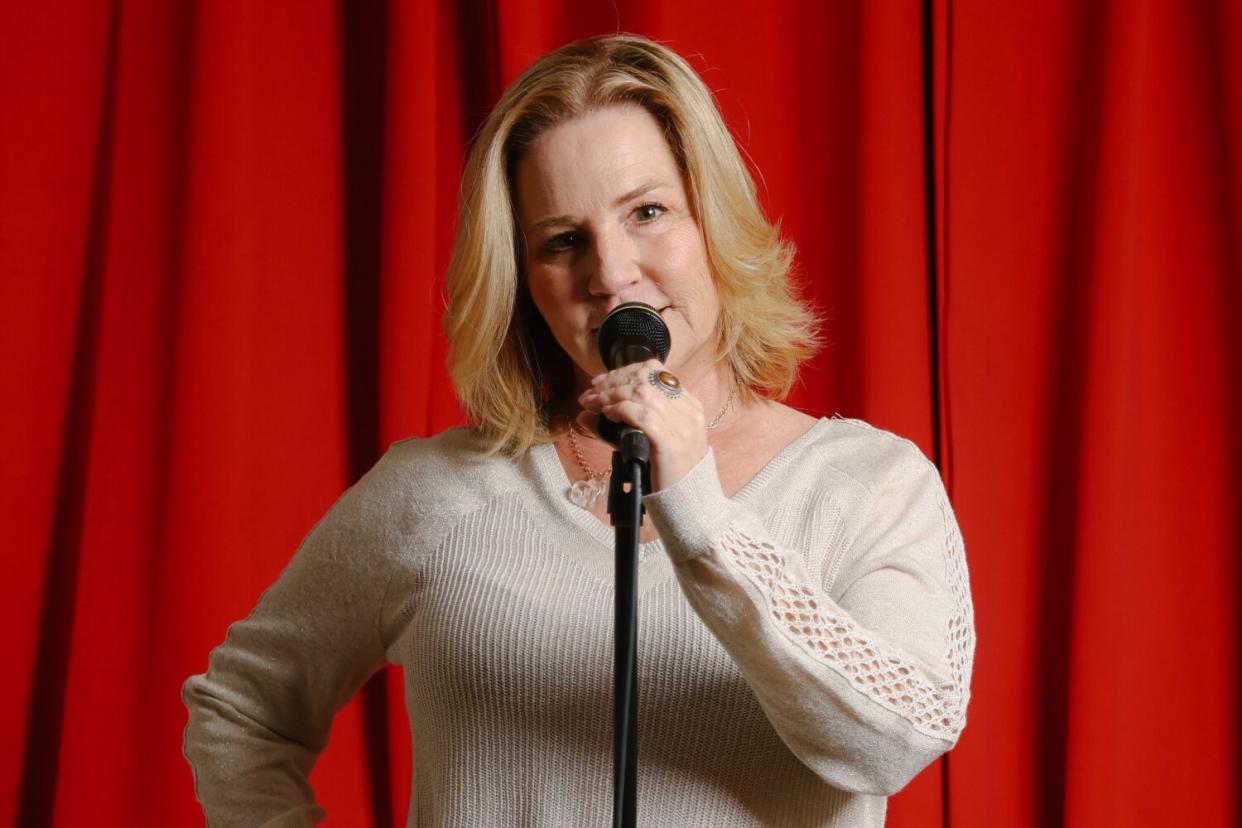
- Oops!Something went wrong.Please try again later.
- Oops!Something went wrong.Please try again later.
The classroom theater is tiny and DIY-looking, a dimly lit studio tucked behind a Sherman Oaks residence. The stage is modest, a raised platform backed by a plain red curtain — it conceals a kitchenette peeking out behind it. And the audience is intimate, 11 women crammed together in metal folding chairs.
But we will see the full range of human emotion onstage tonight — tears, anger, anxiety, humility and a healthy dose of laughter.
This is Lisa Sundstedt’s stand-up comedy workshop, Pretty Funny Women, a females-only event held at her home. Sundstedt’s live stand-up comedy showcase of the same name, which she hosts at comedy clubs, has been running for more than 25 years. She's presented some of the biggest female comics of our day there, including Sarah Silverman, Tig Notaro, Natasha Leggero, Maria Bamford, Chelsea Handler and others. She’s nurtured major talents in her class, back when they were unknown newbies, including "Saturday Night Live’s" Chloe Fineman. Between the two entities, Sundstedt has steered more than 3,000 funny women and counting.
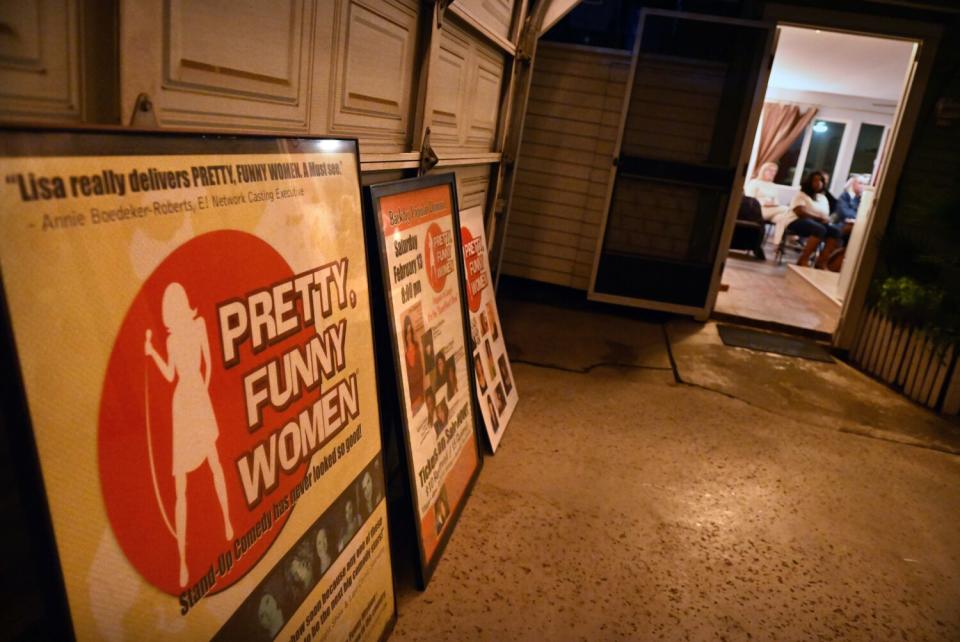
Tonight, the vibe is “The Kominsky Method” meets “Seinfeld” meets HBO’s “In Treatment.” The students — mostly aspiring comedians and actresses — fidget in their seats, nervously avoiding Sundstedt’s gaze. They are each to present a stand-up bit for review.
Meaning: therapy.
“You’re really hard on yourself, super critical, where does that come from?” Sundstedt says from a chair in the back of the class, addressing one woman onstage.
“I’m a Virgo?” jokes 42-year-old Diana Zhawn. Laughter all around.
“Could it be a critical parent's voice, from growing up?” Sundstedt presses. “A mother?”
“Oh — mother, grandmother, aunt … it was, like, a lot of criticism,” Zhawn says. “My grandmother would say I’m the devil and I was gonna grow a tail.”
“See? That’s funny! That’s material!” Sundstedt says, leaping to her feet. “Comedy equals tragedy plus time.”
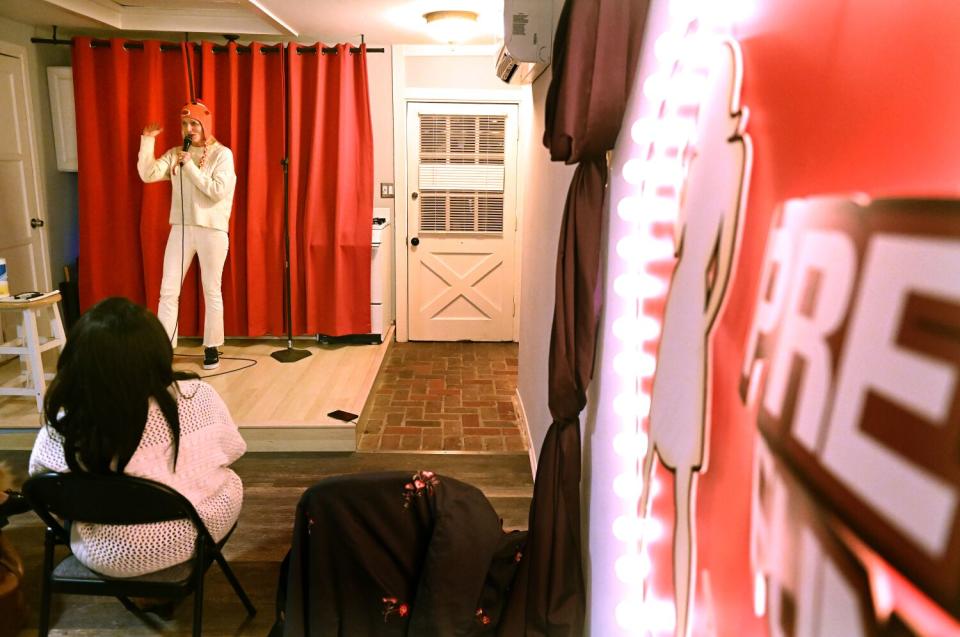
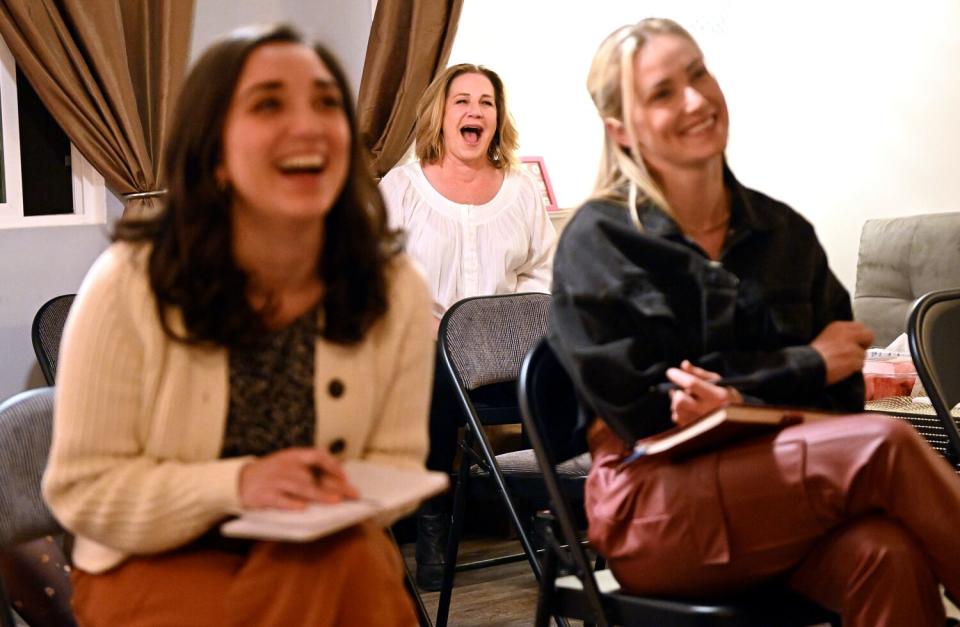
"It’s definitely a very humbling experience," Zhawn says later. "Lisa doesn’t sugarcoat things, she tells you as it is. But she’s very patient. And if she doesn't push like she does, she’s not doing you a favor. She does that because she cares about you succeeding."
Despite her direct and probing style, Sundstedt manages to create what feels like a safe space for these women, who meet her questions with unvarnished honesty. Their six-minute sets are fearlessly candid. Melissa Paakh, 30, tentatively tests a joke about abortion and the reversal of women’s rights; 52-year-old Whitney Cicero opens up about menopause (“I dunno what’s happening down there!” she admits, pointing to her crotch). And 38-year-old Billie Lee rants about self-care enthusiasts (“How about self I don’t care!” she bellows).
But when wholesome-looking Claire Young, 24, takes the stage, her set about her father, a homophobic pastor, ends in tears.
“I’m sorry, it’s a family trauma thing and I thought it was funny,” Young whimpers after being met with silence from the audience.
“Don’t be sorry, we’re learning,” Sundstedt says. “Just because we’re not laughing doesn’t mean we don’t like you — we just don’t understand. The wording is off and needs to be tweaked.”
As Sundstedt gives notes, Young hugs her notebook to her chest, eyes fixed on the floor and tears streaming down her cheeks. When she slumps back down in her seat, the others fall in around her offering shoulder squeezes and hugs.
Then: “OK, who’s up next?!” Sundstedt roars, merrily.
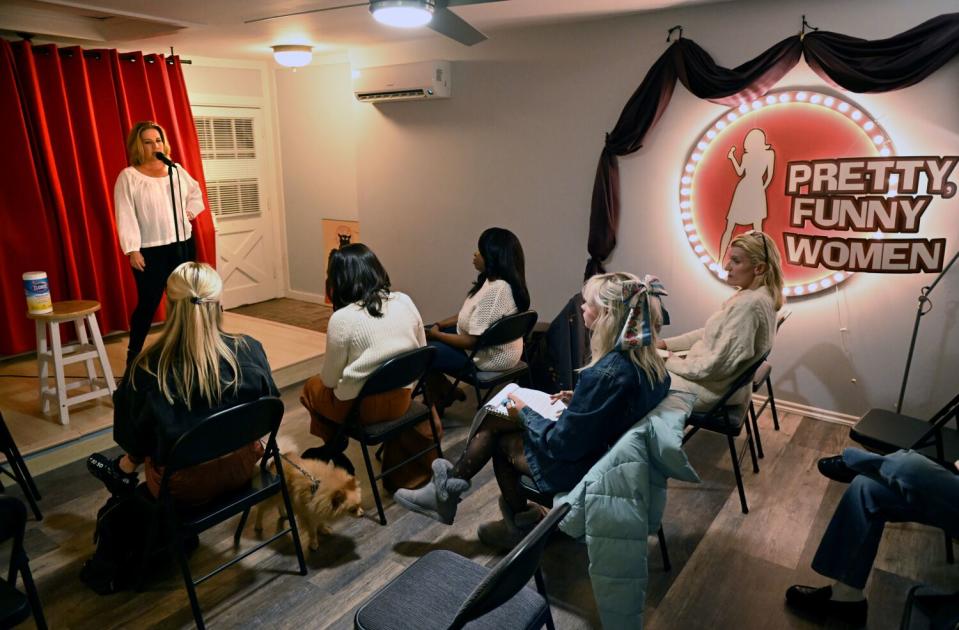
Sundstedt, 55, grew up in Oceanside, Calif., the eldest of four and a born entertainer. She’d direct her three brothers in plays she wrote and watched “The Carol Burnett Show” every Saturday night for inspiration. She always knew she’d be an artist.
After one year at MiraCosta College, Sundstedt dropped out to pursue acting. She got a waitressing job and honed her singing and dancing skills in local classes. That led to nearly a decade of regional theater, mostly musicals, as well as stints performing at Tokyo Disneyland, in a variety show in Morocco and touring with the band Sha Na Na as a featured singer and dancer. Later, voice-over work and television commercials would pay the bills.
But what Sundstedt really wanted to do, was act in sitcoms, like her inspiration, Julia Louis-Dreyfus. An agent she was dating told her stand-up comedy was the quickest route to landing a television gig, so she began making the rounds at open mic nights. Mainstream comedy clubs, in the early ’90s, were too difficult to break into, she says, especially for an unknown female comic.
“It was always 10 men and Margaret Cho. Or eight guys and Sarah Silverman,” she says. “There were, like, five women they would book and if you were a new female comedian, it was very hard to get on one of the main stages. ”
Sundstedt says she became “obsessed, relentless — eat, sleep, drink comedy.”
“I’d drive all over town, three open mics a night, just to get five minutes of stage time to see if a joke worked,” she says.
A sexist encounter, at the Hollywood Improv in 1995, changed the course of Sundstedt’s career.
She was hanging around the club, trying to get stage time, she says, when a male TV producer she met put it simply, from his point of view: “He goes: ‘you’re too pretty to be funny.’ I didn’t know how to feel — is that a compliment because he’s telling me I’m pretty? But then he’s dismissing me.”
The idea for Pretty Funny Women, a live stand-up showcase of mostly emerging female comedians, came the next day.
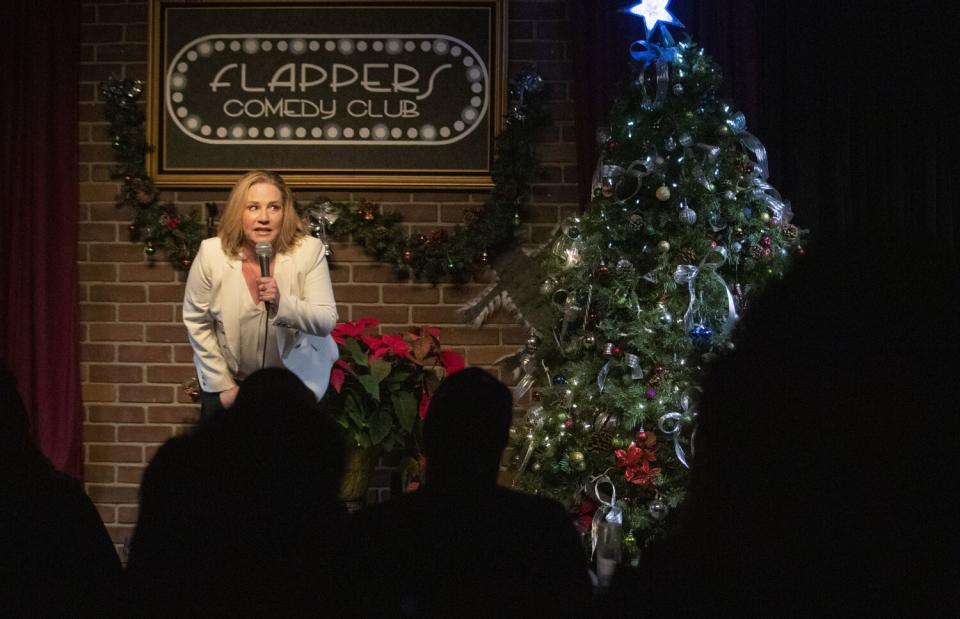
The first show, at the now-defunct Luna Park, sold out. Soon the showcase, at which Sundstedt also performs, was playing at the Comedy Store’s Belly Room, a club night called Mixed Nuts and the small stage at the Hollywood Improv before eventually moving to its main stage.
One night Notaro, then new in town and without a car, rode her 10-speed bike to the Belly Room and asked Sundstedt if she could be on the show.
“I was like, why not, I’ll try ya,” Sundstedt says. “I became such a fan. I put her on every show. She became my closer.”
Handler appeared in the live show as well and eventually, Sundstedt began writing for “The Chelsea Handler Show;” later she became a writer on the first season of “Chelsea Lately.”
Pretty Funny Women, meantime, had hit its stride, running monthly — and nearly continuously — over the decades. It eventually found a permanent home at Flappers Comedy Club and Restaurant in Burbank, where it’s been running since 2011. Monthly shows also take place at the Comedy Store-La Jolla.
Sundstedt turned to teaching in 2006. She'd struggled with alcohol addiction, as well as bipolar disorder, most of her adult life and got sober in 2007. Teaching helped ground her and played a key role in her healing.
“Acting can be sort of self indulgent,” she says. “I wanted to be of service, helping, doing something that was meaningful. And I had this brand — so why not turn it into a school?”
The first workshop, for five women, was held in Sundstedt’s living room. She advertised on Craigslist and in trade magazines, but the class — which focuses on stand-up only as opposed to sketch comedy or acting — grew largely by word of mouth. The majority of her students, Sundstedt says, aren’t aspiring stand-up comedians but “regular people” looking to integrate comedic skills. Lawyers and doctors take her class to relieve stress; business people to hone their public speaking skills; actresses to diversify and gain audition confidence; mothers to get out of the house and escape their kids.
Dr. Margaret Perez, a Tarzana-based chiropractor, took Sundstedt’s class 14 years ago to help her navigate a milestone birthday.
“I thought: I’m turning 50, you’re either gonna get old and set in your ways and boring, or do something outside of the box,” she says. “It was amazing. It gave me confidence in talking to people and I enjoyed the intelligence of writing jokes. And humor is part of healing. Having a lighthearted, fun, easy atmosphere is wonderful for my patients.”
Other alums include Atsuko Okatsuka, whose first HBO special aired earlier this month, Kimrie Lewis of ABC’s “Single Parents” and Rachel Wolfson of the movie “Jackass Forever.”
Lakers owner Jeanie Buss took the class for public speaking purposes, Sundstedt says. She’s now collaborating with Sundstedt, executive producing an upcoming comedy special, “Pretty Funny Women: It’s About F— Time.” The show, open to the public, will tape on Jan. 19 at the El Portal Theatre in North Hollywood, with tickets available on the venue’s website.
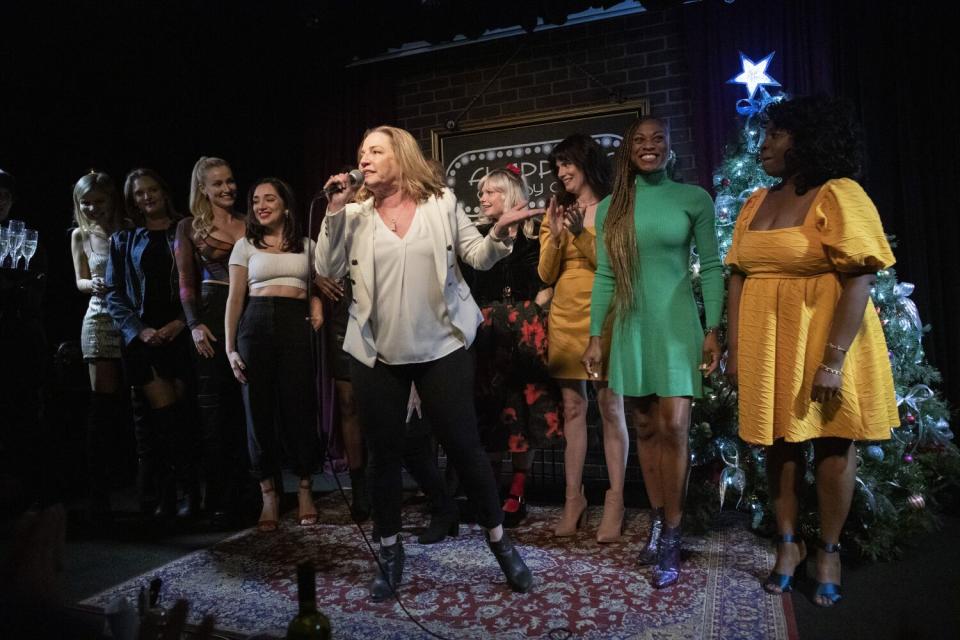
Sundstedt’s approach to teaching stand-up is very particular. She breaks down joke structure for her students, with each class focusing on one archetype. There’s the “Bait ‘n Switch,” the “Act Out,” and the “Twist,” among others. Students must focus on their own lives when writing material. No political or observational jokes allowed.
“Because if a new comic wants to do an observational joke, say about Facebook, every other comic out there is already doing it," Sundstedt says. "She can’t compete. But no one’s doing her story.”
Sundstedt isn’t necessarily the hand-holding type, but it’s for the better in the long run, she says. The comedy scene is hard and hasn’t changed for women as much as one would think, she says. Sexism is still rampant, particularly among emerging male comics on the open mic circuit. Part of her job, she says, is preparing students for that unfortunate landscape.
“If they can’t handle me giving them notes, they shouldn’t be in comedy,” Sundstedt says. “Comedy is brutal. My environment is nice. But club owners fall asleep during your set and then tell you you’re terrible.”
There are many supportive male comics out there, she adds. “But for the most part, the feedback I get from girls who are at open mics where there are men is, they’re objectified and treated poorly.”
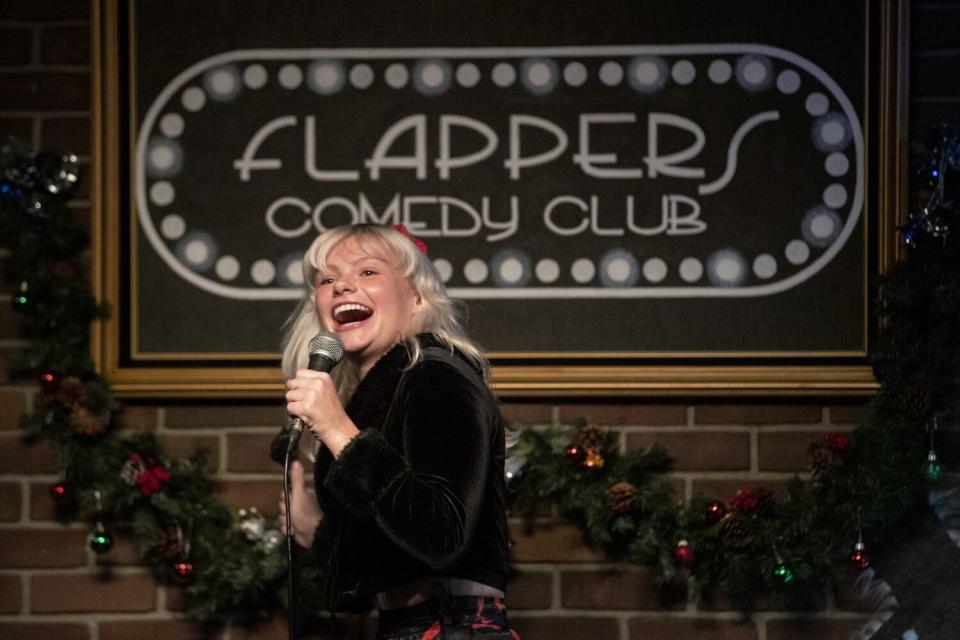
Each of Sundstedt’s workshops culminates in a graduation show at Flappers, in front of a live audience. Students perform the set they created in class. The evening is taped, so that acting wannabes have comedic material for their promotional reels.
Earlier this month, the Flappers stage is bathed in festive Christmas lights and the night’s vibe, unlike the class the L.A. Times observed, is anything but awkward. The ladies are killing it, each in their own way.
Young is effervescent onstage, doing a festive jig as her set gets underway.
Lee is deadpan: “The only self-care I'm comfortable with is self-sabotage,” she says, which gets a big laugh.
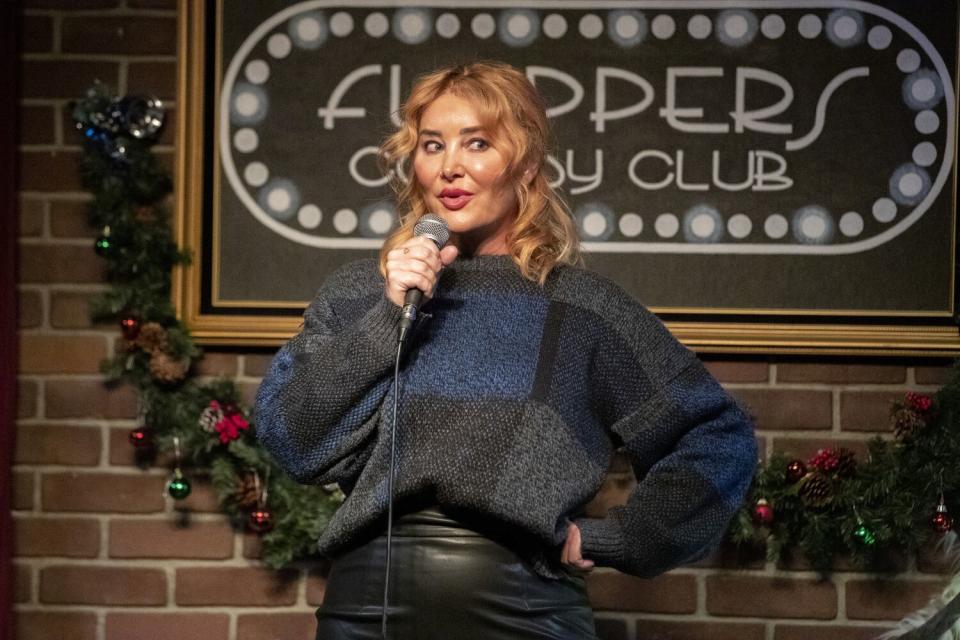
Sundstedt sits in the back of the club, nursing a glass of water. She leans forward, literally sitting on the edge of her seat, as each woman starts her set. Occasionally she mouths the jokes along with the performer, like a nervous mama watching her child in a school production. Often, she’s the first person in the room to burst out laughing, as if hearing the punchline for the first time — a loud, appreciative cackle.
“Oh my God, they really brought their A-game, everyone destroyed,” she says later of the evening.
That pride extends to herself, too.
“I really, really struggled over the years to keep this all current and relevant,” she says. “I’ve come up against a lot of criticism, a lot of men putting it down. But I never give up. These female comics shouldn’t either.”
This story originally appeared in Los Angeles Times.

